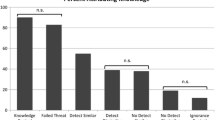Abstract
This paper argues that knowledge is an instance of a more general and familiar normative kind—that of success through ability (or success through excellence, or success through virtue). This thesis is developed in the context of three themes prominent in the recent literature: that knowledge attributions are somehow context sensitive; that knowledge is intimately related to practical reasoning; and that one purpose of the concept of knowledge is to flag good sources of information. Wedding these themes to the proposed account helps to explain a wide range of standard Gettier problems. It also helps to explain barn façade cases, which require a different kind of treatment.
Similar content being viewed by others
Notes
Craig (1990).
The example is taken from Lehrer (1965).
Quoted from Chisholm (1977).
See esp. “Knowledge as Credit for True Belief.”
Hence I concede a point made recently by Robert Shope, that aspects of KSA leave it unclear how the account adjudicates certain kinds of case. Shope is especially concerned here with problems regarding how to distribute explanatory salience. See Shope (2008).
The example is from Goldman (1976).
Shope points out that several cases can be interpreted as raising generality problems for the account. See Shope (2008).
Heller (1995).
Elsewhere I defend a position that is technically a version of attributor contextualism, although it is neither the subject context nor the attributor context as such that is important for specifying relevant levels of generality. Rather, it is the relevant practical reasoning context, which may be that of the subject, the attributor, or some third party. Specifically, the relevant parameters are set by the interests and purposes that are operative in the relevant practical reasoning context. So, for example, if we are trying to decide what we should do, the parameters are set by our practical reasoning concerns. If we are trying to decide what S should do, the parameters are set by her practical reasoning concerns, etc. See “What’s Wrong with Contextualism?”, The Philosophical Quarterly (2008).
Pritchard (2008), unpublished typescript, http://plato.stanford.edu/archives/fall2008/entries/knowledge-value/.
References
Chisholm, R. (1977). Theory of knowledge (2nd ed.). Englewood Cliffs, NJ: Prentice-Hall, Inc., p. 105.
Cohen, S. (1988). How to be a fallibilist. Philosophical Perspectives, 2, 91–123.
Craig, E. (1990). Knowledge and the state of nature. Oxford: Oxford University Press.
DeRose, K. (1995). Solving the skeptical problem. Philosophical Review, 104, 1–52.
Fantl, J., & McGrath, M. (2002). Evidence pragmatics, and justification. Philosophical Review, 111, 6–94.
Goldman, A. (1976). Discrimination and perceptual knowledge. Journal of Philosophy, 73, 771–791.
Greco, J. (2002). Virtues in epistemology. In P. Moser (Ed.), The Oxford handbook of epistemology. Oxford: Oxford University Press.
Greco, J. (2003). Knowledge as credit for true belief. In M. DePaul & L. Zagzebski (Eds.), Intellectual virtue: Perspectives from ethics and epistemology. Oxford: Oxford University Press.
Hawthorne, J. (2004). Knowledge and lotteries. Oxford: Oxford University Press.
Heller, M. (1995). The Simple Solution to the Generality Problem. Nous, 29(4), 501–515.
Lehrer, K. (1965). Knowledge, Truth and Evidence. Analysis, 25, 168–175.
Lewis, D. (1996). Elusive knowledge. Australasian Journal of Philosophy, 74, 549–567.
Shope, R. (2008). Abnormality, cognitive virtues and knowledge. Synthese, 163(1), 99–118.
Stanley, J. (2005). Knowledge and practical interests. Oxford: Oxford University Press.
Author information
Authors and Affiliations
Corresponding author
Rights and permissions
About this article
Cite this article
Greco, J. Knowledge and success from ability. Philos Stud 142, 17–26 (2009). https://doi.org/10.1007/s11098-008-9307-0
Received:
Published:
Issue Date:
DOI: https://doi.org/10.1007/s11098-008-9307-0



